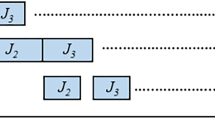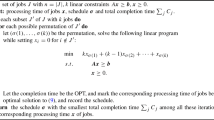Abstract
The makespan distribution of permutation flowshop schedules has been a topic of debate for almost fifty years. Many researchers have confirmed or doubted the famous claim that the makespan distribution of permutation flowshop schedules is asymptotically normal if the number of jobs is sufficiently large. This paper theoretically and empirically investigates the makespan distribution of permutation flowshop schedules and shows that the normality claim is not valid for the job-dominated and machine-dominated flowshops. Errors in the proof of normality of the makespan distribution of permutation flowshop schedules are pointed out. It is shown that the makespan distribution of a permutation flowshop scheduling problem depends on the number of jobs as well as the number of machines.
Similar content being viewed by others
References
Ashour, S. (1972). Sequencing theory. New York: Springer.
Azim, M. A., Moras, R. G., & Smith, M. L. (1989). Antithetic sequences in flow shop scheduling. Computers and Industrial Engineering, 17(1–4), 353–358.
Caffrey, J., & Hitchings, G. (1995). Makespan distributions in flow shop scheduling. International Journal of Operations and Production Management, 15(3), 50–58.
Conway, R. W., Maxwell, W. L., & Miller, L. W. (1967). Theory of scheduling. New York: Wiley.
Chung, K. L. (1954). Contributions to the theory of Markov chains, II. Transactions of the American Mathematical Society, 76(3), 397–419.
Dennenbring, D. G. (1977). Procedures for estimating optimal solution value for large combinatorial problems. Management Science, 23, 1273–1283.
Elmaghraby, S. E. (1968). The machine sequencing problem—review and extensions. Naval Research Logistics Quarterly, 15, 205–232.
Framinan, J., Gupta, J. N. D., & Leisten, R. (2004). A review and classification of heuristics for the permutation flowshop with makespan objective. Journal of Operational Research Society, 55, 1243–1255.
Garey, M. R., & Johnson, D. S. (1979). Computers and intractability: a guide to the theory of NP-completeness. San Francisco: Freeman.
Giffler, B., Thompson, G. L., & Van Ness, V. (1963). Numerical experience with linear and Monte Carlo algorithms for solving scheduling problems. In J. F. Muth & G. L. Thompson (Eds.), Industrial scheduling. Englewood Cliffs: Prentice Hall.
Gupta, J. N. D. (1979). A review of flowshop scheduling research. In L. P. Ritzman, L. J. Krajewski, W. L. Berry, S. M. Goodman, S. T. Hardy, & L. D. Vitt (Eds.), Disaggregation problems in manufacturing and service organizations (pp. 363–388). The Hague: Nijhoff.
Gupta, J. N. D., & Stafford, E. F. (2006). Flowshop scheduling research after five decades. European Journal of Operational Research, 169, 699–711.
Gupta, J. N. D., Smith, M. L., Martz, H. F., & Dudek, R. A. (1968). Monte Carlo experimentation with flowshop scheduling problem (Sequencing Research Report # QT-103-68). Department of Industrial Engineering, Texas Technological College, Lubbock, TX.
Hejazi, S. R., & Saghafian, S. (2005). Flowshop scheduling problems with makespan criterion: a review. International Journal of Production Research, 43(14), 2895–2929.
Heller, J. (1959). Combinatorial, probabilistic, and statistical aspects of an MxJ scheduling problem (AEC Research and Development Report # NYO-2540). Institute of Mathematical Sciences, New York University, New York, NY.
Heller, J. (1960). Some numerical experiments for MxJ flow shop and its decision-theoretical aspects. Operations Research, 8(2), 178–184.
Johnson, S. M. (1954). Optimal two- and three-stage production schedules with setup times included. Naval Research Logistics Quarterly, 1, 61–68.
Moras, R. G., Smith, M. L., Kumar, K. S., & Azim, M. A. (1997). Analysis of antithetic sequences in flow shop scheduling to minimize makespan. Production Planning and Control, 18(8), 780–787.
Nowicki, E., & Smutnicki, C. (1996). A fast tabu search algorithm for the permutation flow-shop problem. European Journal of Operational Research, 91(1), 160–175.
Nowicki, E., & Smutnicki, C. (2006). Some aspects of scatter search in the flow-shop problem. European Journal of Operational Research, 169(2), 654–666.
Nugent, C. E. (1964). On sampling approaches to the solution of n- by-m static sequencing problem. PhD dissertation, Cornell University, Ithaca, NY.
Panwalker, S. S., & Charles, O. E. (1981). Analysis of the left tail for the makespan distribution in flowshop problems. Opsearch, Journal of Operational Research Society of India, 18(4), 215–220.
Pulle, C. V. (1976). An analysis of inter-relationship of multiple criteria in a flowshop with set-up sequence dependence. PhD dissertation, Texas Tech University, Lubbock, TX.
Rinnooy Kan, A. H. G. (1977). Machine scheduling problems: classification, complexity and computations. The Hague: Nijhoff.
Taillard, E. (1990). Some efficient heuristic methods for the flow shop sequencing problem. European Journal of Operational Research, 47(1), 65–74.
Taillard, E. (1993). Benchmarks for basic scheduling problems. European Journal of Operational Research, 64(2), 278–285.
Watson, J. P., Barbulescu, L., Whitley, L. D., & Howe, A. E. (2002). Contrasting structured and random permutation flow-shop scheduling problems: search-space topology and algorithm performance. INFORMS Journal on Computing, 14(2), 98–123.
Author information
Authors and Affiliations
Corresponding author
Rights and permissions
About this article
Cite this article
Jin, F., Gupta, J.N.D., Song, Sj. et al. Makespan distribution of permutation flowshop schedules. J Sched 11, 421–432 (2008). https://doi.org/10.1007/s10951-008-0071-y
Received:
Accepted:
Published:
Issue Date:
DOI: https://doi.org/10.1007/s10951-008-0071-y




